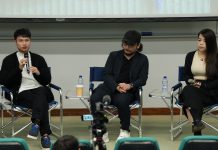Chow is not afraid to stand up for what is right. He also hopes his students will speak out for what they believe in. To encourage student participation in his course, political philosophy, Chow opened a Gmail group which serves as a discussion forum for students. Discussion topics are not confined to course materials, but can be on any topic students are interested in. Chow tries to reply to as many posts as possible.
The group occupies a great deal of his time, but he treasures it as a platform for discussion. He shows Varsity a book he published that records the discussions in the group in the first year he taught the course.
The discussions do not end once a student completes the course. Chow has set up another online forum group which allows all his students to join in. Leung Ho-yiu, a second-year journalism and communication student at CUHK took Chow’s course last year, and is a member of the second Gmail group. He still reads the posts on the forum sometimes.
Leung says Chow does not only care about his course, he truly cares about his students. “The thoughtful design of the course is not only for the course alone. It is a whole package to enlighten students,” he says.
Chow has his own education philosophy. He opposes the knowledge-based education system in Hong Kong. “We only have knowledge and technique-based teaching in our university. However, to lead a good life, the education of feeling is very important. I don’t want our students to be trained to become competitors who are antagonistic to society. I hope they can retain a sense of empathy and a little innocence.”
Chan, a second-year business student who preferred not to give his full name, is taking Chow’s course this semester. He says it is the best course he has taken so far. “He is a teacher with a heart,” he says.
Chan says the things Chow teaches run counter to the training he receives in the business faculty, where he learns about profit maximisation and market control. Chan has always been interested in social and political issues, and in Chow’s class he can freely express his views on issues like justice and monopolies.
“Chow is not like other professors,” says Chan. “He really listens to students’ opinions and comments seriously.”
Not many business students take Chow’s course. “A lot of things that he does are regarded by business students as a waste of time and rubbish. He organises many non-commercial and artistic activities,” explains Chan, adding that he admires Chow’s courage to do what he believes is just and right.
Chow’s persistence in his beliefs stems from his childhood. Born in a poor village in western Guangdong, he moved to Hong Kong with his family at the age of 11.
“It was really difficult in my first few years in Hong Kong. The change was too great. I felt like I was abandoned in a completely new place, with no friends around and a poor living environment,” he recalls.
As a new immigrant, Chow was an outsider at school and in society. He could not fit in with the locals; he could not find his personal identity. He was confronted with questions about who he was and what he wanted to be.






































